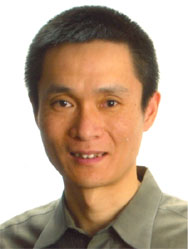NIH Award from the National Institute of General Medical Sciences
Chemistry and Mechanism of Direct DNA Repair Proteins
- Principal Investigator:Chuan He, PhD, Associate Professor, Department of Chemistry
- Start Date: September 15, 2009
- Total Award Amount: $115,943
Public Health Relevance
The success of this research program will significantly advance the understanding of these two protein families and provide general mechanistic implications for other repair systems.
Project Description
Accumulation of genetic changes due to the presence of unrepaired DNA lesions can lead to the development of cancer and other diseases. Almost all organisms have evolved delicate systems to locate and repair these DNA lesions. This research program aims to understand the fundamental mechanisms of two direct DNA dealkylation repair protein families. Chemical synthesis, protein biochemistry, macromolecule X-ray crystallography, and various spectroscopic/physical techniques will be employed to elucidate the mechanism of the DNA base repair proteins O6-alkyguanine-DNA alkyltransferases (AGT) and AlkB. These proteins play vital roles in protecting genome integrity. The repair activity of the human AGT protein is also a major factor in tumor resistance to various alkylating chemotherapies. AlkB represents a new type of DNA repair function that has just been discovered. This family of proteins repairs alkylated base lesions by using a novel oxidative dealkylation mechanism. The structure and mechanism of the bacterial and human AlkB proteins remain mostly unknown. Both AGT and AlkB form unstable complexes with DNA, which significantly hampers efforts to characterize the protein/DNA interaction of these proteins.
Proposed here are chemical strategies to stabilize or trap both specific and non-specific protein/DNA complexes of AGT and AlkB for structural characterization. DNA probes have been designed which will be synthesized and used to study the mechanism of AlkB. Various physical and biochemical methods will be employed to characterize the iron(ll) centers of AlkB. Our goal is to fully elucidate the damage-searching, -recognition and -repair mechanisms of these proteins. In addition, more potent inhibitors will be developed for human AGT, a proven target for improving the efficiency of anticancer treatments.
This award is funded under the American Recovery and Reinvestment Act of 2009, NIH Award number: 3R01GM071440-05S1

Chuan He, PhD,
Associate Professor, Department of Chemistry
